
With more than 1,400 recreational cannabis licenses approved (or partially approved) in Massachusetts for the cultivation, delivery and retail of marijuana, thousands of new jobs have been created since the implementation of adult-use laws.
Ethos in Dorchester was approved as a medical dispensary in 2020. Last month it was approved to sell cannabis recreationally in the same store. The hiring impact has been immediate.
Ethos Vice President of Marketing Blandine Jean-Paul says multi-state operators like hers have the capacity to ramp up quickly and hire fast – bringing benefits to the same communities deemed disproportionately impacted by the drug’s criminalization.
“I think we have to allow these larger corporations to at least build these opportunities for people to come and become employed in the business and then potentially grow into cannabis that way,” she said. “My son started as a cannabis advisor when I took my first job with a cannabis company and now he's assistant GM.”
Ethos has said in its public filings it is creating a diversity plan for recruiting workers and vendors. Jean-Paul, a Black woman in a male-dominated industry, says she personally advocates for inclusion every day.
State data shows among the 22,319 people with active accreditations to work in a variety of recreational cannabis jobs, 69% are white. Massachusetts is 68% white, according to the U.S. Census.
For more on the state's equity promises in cannabis and how they're shaping up, click here.